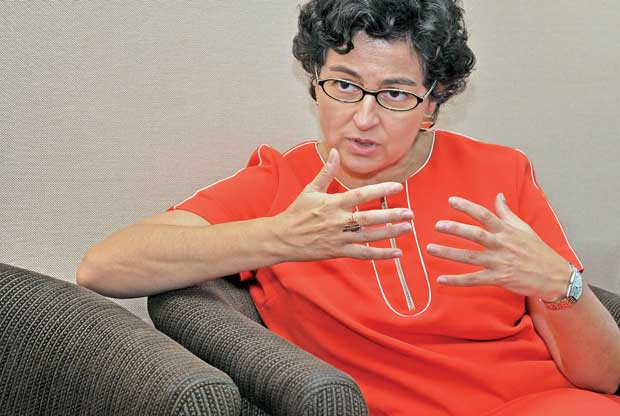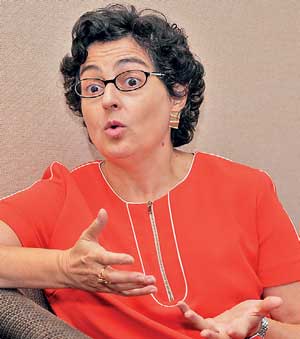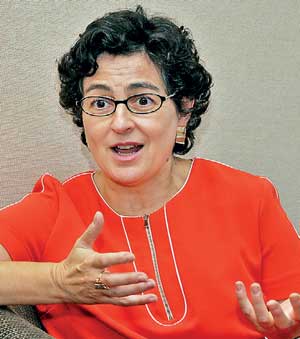Reply To:
Name - Reply Comment
Last Updated : 2024-04-25 18:55:00

Sri Lanka comes under fresh spotlight as it hosts the World Export Development Forum (2016), an international event that would help improve the nation’s focus on trade. However, being a mere host will not reverse our island nation’s dampening export performance. Insights gained would need to be turned into actions in a realistic and practical manner. Mirror Business sat down with International Trade Centre (ITC) Executive Directress Arancha González for a discussion, where we were able to pick her brain to gather some points that could help change the country’s export sector fortunes. While commending Sri Lanka for its determination and potential, trade expert González asserted that much remained to be done and pointed out that was required was renewed focus with quality at the core. Following are the excerpts of the interview
As Sri Lanka is selected to host the World Export Development Forum (WEDF) 2016, what is the significance of the event to the country?
The WEDF means two things. One is internal, the other is external. To the world it is that Sri Lanka is a country that is open for business. That Sri Lanka should be in the map of any investor who is willing to find a good location in South Asia to operate globally. The message internally is that trade is a good opportunity to grow, a fiscally responsible way to grow and contribute in generating jobs in Sri Lanka.
However, this requires upping the game, improving the competitiveness of the businesses in the country, and continuing to improve the business environment. So it is a way to embark domestic actors into a reform process, one that has to be followed by any economy, anywhere, even more so in Sri Lanka, which for many years was greatly concentrating in a domestic war. It forgot that there was a competitive dimension to the economy and its neighbours. So it is a way to feed the dynamic reform process, and at the same time brand Sri Lanka as an opportunity for doing business in South Asia.

Have the authorities done enough to capitalize on this event?
I think so according to what we have seen. We normally partner with the government in an array of multiple manifestations. To drive the WEDF last year we selected Doha, Qatar, the years before,Rwanda, China, Indonesia, and Mexico and others.
For me it matters that the quality of our work with the local counterparts is good. And here the relationship with the counterpart is excellent. The Export Development Board (EDB) has been an extremely good partner for ITC to set this up. We have about 200 companies in Sri Lanka that had been incubated to do business, and find business partners and investors during the forum.
But it doesn’t stop there. When you curate and mentor a group of companies for this event you do so also for many more (entities) that come thereafter. The investment in my view is a wise one. I observe that in Sri Lanka the businesses and government are reacting very positively to this.
I was here in May for the pre - launch and I saw an incredibly vibrant business community, extremely committed to make it work. The local business community is co-partnering with the EDB to make this happen. I see a lot of commitment from all sides of the stakeholders in Sri Lanka.
How and why was Sri Lanka selected to host the WEDF?
Countries bid to host WEDF. They propose themselves. We look at the one nation where our partnering with them would in a way mean something specific. When we did this with Rwanda, the first time in Africa, it meant a lot.
You can use trade as a way to essentially help a country overcome its distance from big markets, or small size and other challenges. In the case of Sri Lanka what attracted us to partner was the potential of the country. Potential that needs to be tapped to its full extent. It is not so yet. Huge potential this country has as a trading hub, a position it had historically but somehow lost. We think it’s time we helped Sri Lanka regain.
In addition to this, Sri Lanka has an interesting geographical location. It falls within the big trading routes, close to big markets. It is a relatively small economy and is an island state. We aim at demonstrating that in the economy of the 21st century, your geography doesn’t matter. Your size doesn’t matter that much. What matters is the quality of your policies and the quality of your people. What matters is also to extent at which the assets are leveraged in the domestic economy.
We think this is the message the government and the business have here, and we want to contribute to that.

What is your view of the business climate in Sri Lanka? Is it conducive enough for exports to pick up?
I think it has improved. We have been measuring non-tariff barriers via a survey in 2010. The survey has been repeated partially in 2016. What I see is an improvement in the situation compared to 2010, but if you ask me has Sri Lanka done everything it could to improve the business climate? The answer is certainly not.
My sense is that the glass is half full but there still needs to be serious commitment to reforms that would make the life of traders, importing or exporting, and investors, easier and simpler. Through that, it will be contributing to better quality jobs and growth. So still there is work to be done. I do see progression in the reforms. What is necessary is the pace. Sense of direction is right, but what is needed is to accelerate the pace of these reforms.
Sri Lanka needs to understand and grasp that everyone is moving aggressively faster and it is imperative to keep up.
Where do we stand amongst our regional peers? Not just in numbers but also in the manner in which we operate and function?
It’s quite complex and one cannot compare a 20-million market island state to the 1.2-billion Chinese market. The game in Sri Lanka is one that has to take into account its assets and its challenges. It cannot be a game of big volume, low quality. It can only be higher value added, lower volumes, whether it is in agriculture, manufacturing, or in services. The last named is one that has most of the untapped potentials of the island. Be it on tourism, logistics or IT, these are where the future potential are but they are not tapped to their fullest.
Higher value added is a medium to long term game because you need to have geared the businesses back home. If you want them to move from doing agriculture to processed and branded agricultural products, then you need to up your game significantly. It is perfectly doable.
You are suggesting we need to focus on premium products and services?
Yes. Premium is the way to go forward for Sri Lanka. This requires better skills, labour, increased investment in education, quality education, and matching better the market’s labour demands. Needed are also quality infrastructure such as laboratory, packaging centres, and certifying organizations that would give consumers the guarantee that Sri Lanka offers premium products and services.
Despite the keenness in pushing exports, statistics indicate Sri Lanka is moving backwards in this regard? What are we doing wrong?
We have to be careful when analyzing trade figures. We observe strong headwinds in the area of trade. You have got trade that is growing well below the average of the pre-2008 crisis levels. Trade growth is slowing worldwide and Sri Lanka is not immune to this slowdown.
Secondly, Sri Lanka has a lot of its exports going to lower growth markets. Within this low growth of trade you also have areas with low GDP growth, like Europe. A big chunk of Sri Lanka’s exports are to that destination. Asia, with the rebalancing of China we are seeing more modest growth rates. In my view, a big part of understanding the figures has to do with understanding the global context.
So what do you recommend?
What Sri Lanka can do, or do better is to identify which products and markets it could diversify into. It should look at markets that it has yet to enter. This is why I find it interesting that Sri Lanka has a very open trade negotiating agenda, with agreements being negotiated with Singapore, China, and India among others.
This is important because it is about rebalancing, finding new sources and new markets. It is also about finding new products and new sectors where Sri Lanka is not fully utilizing its potential. This is a big part of the initiative we are starting this month, financed by the European Union, to support and improve the trade performance by focusing on value chain that would be of higher growth in the future.
The EDB has identified a few sectors, traditional ones, to move forward. Do you think they are the right ones to focus on?
More needs to be done in sharpening the analytical tools. Those sectors that have been identified do have potential but they are not the only ones. Within the selected sectors you need to further drill down. Taking tourism as an example, it has big potential, it goes without saying. Fine, but tourism is everything from wellness tourism, leisure, medical, culture, and so on. It is not enough to just say ‘tourism’. You need to nail this down if you are in the strategy of lower volume higher value added. In that case the analysis needs to be very much refined. And this precisely is what we will be doing with the EDB and with the trade ministry under the proposed programme.
Policy inconsistency has been cited as a key factor for sluggish export performances. What is your take in this regard? How detrimental would be the outcome if it was not addressed in the near future?
From what businesses are telling us, there are areas that have improved from what it was back in 2010. For example, procedures for export and documentation for the same have significantly improved since then. This has to do with automatizing procedures, less scope for arbitrary decisions, or longer approvals. This is an area that has seen clear significant improvement. Then there were areas where companies have said they were facing difficulties. For example in the import side they are telling us that they are facing issues within the borders of Sri Lanka. They are also telling us there are difficulties in processing payment systems with the Middle East and India. They are telling us that markets that they are facing difficulties are in India and China. It’s interesting to note that it is these two countries that Sri Lanka is negotiating with.
All of these mean that it matters that your trade policy is a good one. It matters that the business environment is conducive. It matters to know what businesses think are the biggest obstacles. That is why our advice is to set a baseline and measure consistently year after year how you are moving compared to the original mark.
I would also say that I see progress happening in the country. When you make reforms you can see that they work. So accelerate the pace of these reforms. They can work big time to lower the cost of doing business.
SMEs have been identified as an essential ingredient to fuel the economy. Authorities say they are being supported. In reality however, they are not given enough attention. In our rush to reach export targets it is the bigger players who receive much attention. What should be the course of action here?
A country like Sri Lanka needs inclusive growth. It is not just growth. Inclusive, from where we see it, but has three dimensions.
First is SMEs, which at the end of the day are 98 percent of the economy of any country, and they represent over 70 percent of employment of any country. You will not achieve inclusive growth if you do not work with SMEs.
Second is youth entrepreneurship. Especially in a country like Sri Lanka that has an amazingly big pool of young talent, leveraging this talent is important.
The third is women entrepreneurs. Here Sri Lanka has a bit of homework to do. When I look at the figures I see that you have assets that are untapped. The need of the hour is for Sri Lanka to tap into every possible source of growth it can find. The more these sources of growth are granular, the more they will percolate and there will be more inclusive growth.
These are three essential dimensions to ensure inclusive growth. If these three elements are supported to be trade actors, then it would add quality to the growth the island nation is after.
Big companies need less support from the government for exports, what they need is more emphasis on business environment. SMEs need more focus on supporting them to break into a foreign market. For them the assistance required is in finding and connecting with a market, along with help in gaining access to finance.
For young entrepreneurs it is more about connecting the incubation centres with the market so that they can move on to commercial activity. In the case of women, which is very often, and in the case of Sri Lanka, it is about moving them from the informal sector to formal activities. A characteristic of the informal sector is low value addition, which means low contribution to national growth.
These mentioned dimensions with emphasis on the different ingredients are what will make a difference.
What according to you would help reverse Sri Lanka’s grim export performance?
Investing in quality, quality, quality! Quality of the labour, quality of the product, and quality of the policies. In a country that wants to do low volume, high value, quality is key. Quality along the value chain. Quality should start from the business environment, ends when the company has transacted with the market, and all the steps in between.
What is expected of the government and stakeholders to help achieve the desired export status?
Extremely close dialogue. Very deep cooperation is mandatory. I don’t know of any country where businesses succeed without governments and vice versa. The recipe is to work together. We are seeing this at the forum but hope it is continued and maintained long after as well. This is essential to not only make trade possible but also to make trade happen. The two coming together will be the reality of this country.

Add comment
Comments will be edited (grammar, spelling and slang) and authorized at the discretion of Daily Mirror online. The website also has the right not to publish selected comments.
Reply To:
Name - Reply Comment
US authorities are currently reviewing the manifest of every cargo aboard MV
On March 26, a couple arriving from Thailand was arrested with 88 live animal
According to villagers from Naula-Moragolla out of 105 families 80 can afford
Is the situation in Sri Lanka so grim that locals harbour hope that they coul